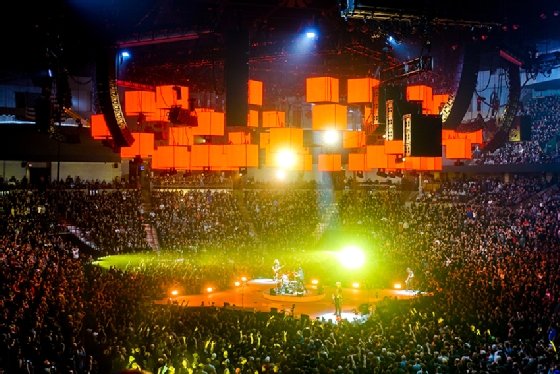
Melpomene - Fotolia
Spokane venues up their game with new guest Wi-Fi network
The Spokane Public Facilities District refreshed its Wi-Fi infrastructure with equipment from Aruba Networks for improved device support, coverage and IT management.
The year was 2017. Hockey fans and concert-goers arrived at their local arena in Spokane, Wash., for a night of entertainment. They tried to post pictures on social media and found they had no Wi-Fi connection and there was no guest Wi-Fi network to join.
This is not the plot of a horror movie. This was the reality for fans in Spokane up until 2018. For years, the Spokane Arena -- a 12,500-seat venue under the domain of the Spokane Public Facilities District (PFD) -- was known for not having a guest Wi-Fi network. In addition to the arena, the Spokane PFD governs the First Interstate Center for the Arts and the Spokane Convention Center. All of these venues had aging network equipment and lacked sufficient capacity and coverage.
"We were behind the times and wanted to catch up because we value providing the best guest experience we can," said Ryan Wilson, IT manager of Spokane PFD. The arena Wi-Fi refresh was a long time coming, he added.
The Spokane PFD deployed a new Wi-Fi infrastructure from Aruba Networks in its arena and arts center in 2018. The Aruba services included access points (APs), switches, ClearPass for security and AirWave for management. The convention center will begin deployment by the end of March.
 Ryan Wilson
Ryan Wilson
Wilson said his organization is looking forward to the new central management system and providing a reliable guest Wi-Fi network.
Zero to 100: Major upgrade for arena Wi-Fi
Of the three venues, Wilson said the Spokane Arena saw the biggest change with the Wi-Fi upgrade. As the arena had no prior guest Wi-Fi network, the IT team had to work from the ground up to implement it and upgrade the arena's internal network for the Spokane PFD staff.
"There was a lot of extra cabling added in the arena where we were going from a minimal AP density to a large, public venue with high density and capacity," Wilson said. "Before, none of that infrastructure existed, so a lot of work went into cabling and mounting the APs in the places we needed for the type of coverage we wanted."
One major advantage of this upgrade was the ability to provide a robust Wi-Fi experience for guests, Wilson said. Spokane PFD also wanted clear end-to-end reporting capabilities for its IT team, improved device management and automated device integration.
Since the deployment, coverage in the arena has improved and now supports more devices. Coverage also expanded outside the arena to select service truck and bus lots.
Another aspect of the new network is customized skins, which are splash pages unique to each venue. These skins offer guests lists of amenities available to them and customization for specific events.
"Our venues all have their own identity, and when a guest comes into one of our venues and connects to the guest Wi-Fi, we want the idea of that venue to carry through," Wilson said.
The importance of network flexibility per venue
While each venue shares the same network, each site has individual needs for its specific events. Yet the biggest variation comes from the convention center, as it hosts a wide assortment of events that have different individual network needs.
"We are providing custom networking services to the client, the planner [and] the promoter. But we also need to provide safe, secure and segmented network access for the guests that come to those events," Wilson said.

The Spokane Arena and the arts center operate similarly. They host consistent types of events that require minimal networking services, so the primary focus is to have secure, reliable Wi-Fi for guests. But the convention center can host anything from RV shows to fundraiser luncheons to proms -- and sometimes all in a single weekend. Each event requires network customization that has to be flexible, secure and segmented -- and the Spokane PFD hopes to offer just that.
Wilson said he hopes the Wi-Fi will be fully deployed in the convention center by this spring. The Spokane PFD also hopes to integrate more IoT capabilities into its network infrastructure to enhance guest experiences and streamline operations for its network teams.
Complications of a complete network refresh
The Spokane PFD IT team is still riding the learning curve of its new system and hopes to eventually condense its day-to-day operations onto one central system. However, the most difficult part of the deployment was working around the event schedules for the venues. The facilities operate 365 days a year, and turning down events was not an option.
"The biggest challenge has been implementing this over the course of time and working around events so we can keep our existing networking services up and available, while simultaneously trying to upgrade and improve them," Wilson said.
However, the venues already had a wired network upgrade with Aruba switches, so following suit with the wireless network made for a smoother overall deployment. Spokane PFD focused on beefing up its existing infrastructure, which mainly focused on cabling and mounting APs, according to Wilson.
The Spokane PFD is hopeful for the future of its venues and networks, and Wilson said the group is looking forward to guests returning to experience the new guest Wi-Fi network.
"We're really happy with the performance so far, but we'd like to see higher adoption rates," Wilson said. "So, if we've been disappointed at all, it's that we haven't had more people take advantage of it."





